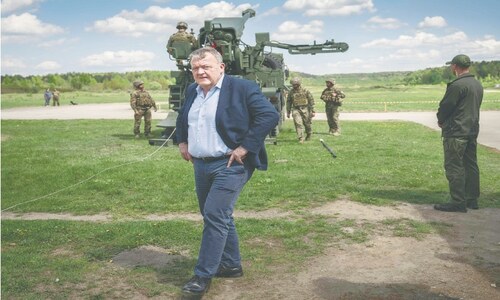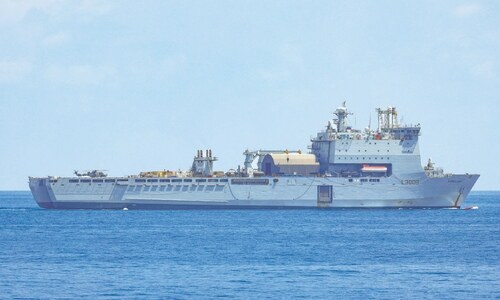WASHINGTON, Oct 8: Former US secretary of state Henry Kissinger gave Israel tacit approval to violate a US-Soviet brokered truce in the 1973 Yom Kippur War, according to newly declassified documents released on Tuesday on the 30th anniversary of the start of the conflict.
The documents indicate that Kissinger secretly conveyed to the Israelis that Washington would understand if they took a “slightly longer” time in observing a deadline for the UN-backed truce which was due to take effect on the evening of October 22, 1973.
His comments appear to have emboldened the Israelis, who were complaining of truce violations by their Arab foes, to allow their troops to encircle and trap the Egyptian Third Army, according to the documents compiled by the National Security Archive, a private research group at the George Washington University.
After brokering the truce with the Soviets on a hastily arranged visit to Moscow, Kissinger said in a classified communique that Washington wanted the truce to go into effect 12 hours after the UN Security Council because a four-hour communications breakdown had prevented Israel from being notified of the ceasefire initiative at the United Nations.
“We ... could accept Israeli’s (sic) taking slightly longer for reasons stated above,” he said in a top-secret cable sent to president Richard Nixon’s national security advisor Brent Scowcroft on October 21.
“This communication for obvious reasons requires total discretion,” Kissinger added, according to the cable, one of 94 documents released by archive.
From Moscow, Kissinger headed to Israel where he conveyed a similar message on October 22 to Israeli prime minister Golda Meir during a meeting at her guest house outside Tel Aviv, according to a MemCon, or Memorandum of Conversation, initially classified “top secret,” “exclusively eyes only.”
Meir complained to Kissinger that neither Egypt nor Syria — who launched the war as Israel prepared to celebrate Judaism’s holiest religious day — had even mentioned the impending ceasefire and continued to fight unabated.
Kissinger, noting he had a long flight home and would be en route when the ceasefire was to take effect, replied that the United States would not disapprove of post-truce Israeli military action while he was in the air.
“You won’t get violent protests from Washington if something happens during the night, while I’m flying,” he said, according to the MemCon. “Nothing can happen in Washington until noon tomorrow.”
“If they don’t stop, we won’t,” Meir responded.
Kissinger then appeared to give Israel a “green light” to carry on fighting, according to the document.
“Even if they do ...,” he responded, according to the document which makes clear that Kissinger’s voice trailed off at that point.
Israeli forces then launched a major attack which prompted the United States to go on alert for possible nuclear hostilities, according to the documents.
“To settle the crisis, Kissinger would have to exert strong pressure against Tel Aviv,” the National Security Archive said in a statement released with the document collection.
Although the nuclear crisis was ultimately averted, Kissinger wrote later that he “had a sinking feeling that (he) might have emboldened” the Israelis with his comments, according to the documents.
The archive’s statement noted that Kissinger’s own published recollections of the Yom Kippur War omit some of the events mentioned in the documents and do not entirely correspond to the information contained in them.—AFP
















































Dear visitor, the comments section is undergoing an overhaul and will return soon.